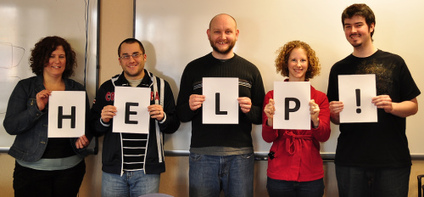Get What You Want: A Crucial Fact Your DailyHap Author Forgot to Mention
by Jordan Myska Allen, a lover of life and entrepreneur. He acts as a psychological, spiritual, and professional consultant and practices applied integral thinking.
Serving others is a very important part of happiness, and I have not talked about it nearly enough.
Our well being—physical, mental, emotional, and spiritual—often seems like a personal endeavor. But pursuing health and happiness alone is destined to fail.
Studies Show that Happiness is a Group Effort
We know that positive relationships are a huge factor in well-being and health. Recent studies have shown that having a sense of purpose in life results in healthier gene expressions than sheer pleasure seeking. Other people matter when it comes to daily happiness.
This principle extends far beyond happiness. No matter what you want in life (happiness, health, success, power, enlightenment), you are better off getting it with other people.
Can You Think of a Time that Helping Made You Sad?
We all personal experiences of the immense and lasting joy that comes from helping others, whether that comes in the form of a tax-deductible donation to an organization we love, spending a morning serving food to the homeless, or counseling a dear friend in crisis.
Was there ever a time that helping others made you sad? Was there ever a time it didn’t make you happy?
The Societal Value of Selflessness
Our most revered figures in history—and those that seem the most contented with life—have generally been those who served the world selflessly. Think about Mother Teresa, Nelson Mandela, Ghandi, and the Dalai Llama.
This is an obvious fact, but bears further scrutiny. We love and admire these people, we strive to be more like them. They are arguably the most peaceful and satisfied people, along with various spiritual practicioners.
Yet which do you think returns more search results: “Invest like Warren Buffet” or “Love like Mother Theresa”? Better yet, try “Lead like Steve Jobs” or “Lead like Nelson Mandela.” Steve Jobs was a genius, but who would you rather have as your leader? Who would you rather emulate for the sake of your deepest desire?
How Can I Help?
I have tossed around words like service and help pretty loosely. What really helps? It is often difficult to determine, and even the best intentions can lead to disastrous consequences. The ironic truth is that our world is incredibly complex and we humans cannot possibly take into account enough information to understand how one action affects the whole world.
Yet there is one thing we can always do. Think of help and service as an expression of love. The best way you can help yourself and others is to use your talents and strengths to express love.
Unraveling Hidden Motivations
Many times we may be “helping” by a conventional definition—offering financial support or doing someone a favor—but unbeknownst to ourselves we are motivated by fear.
Think for a moment. Are there times where you “help” others in order to avoid being neglected or hurt? Are there times where you help others in order to gain acceptance and feel like enough? To fulfill your image of yourself, and how you want to be seen by others?
These are not terrible things, especially when the result is truly helping someone else. But becoming habitually aware of these motivations will eventually allow us to choose to help from a genuine desire to express love. That kind of help will have a much deeper and longer lasting impact.
Changing Minds
How often in a typical day is your thinking egocentric? Where everything you do is in your own best interest? What would happen if you shifted a fraction of that time—however big or small that block is—to focus on the whole system around you (including yourself).
How different would your day be you considered a way to be of service (express love) to each person you interact with—whether that’s a smile, an expression of gratitude, or an ear to listen to them? How different would the world be if we all adopted that perspective more often?
Changing Schedules
Furthermore—how much of your scheduled time is dedicated to expressing love? Think about the week, month, and year to come. What motivation is behind your thinking? What are your goals?
If health and happiness are your goals, you will want to be sure you don’t miss this huge piece of the puzzle: put helping others in your plan!

